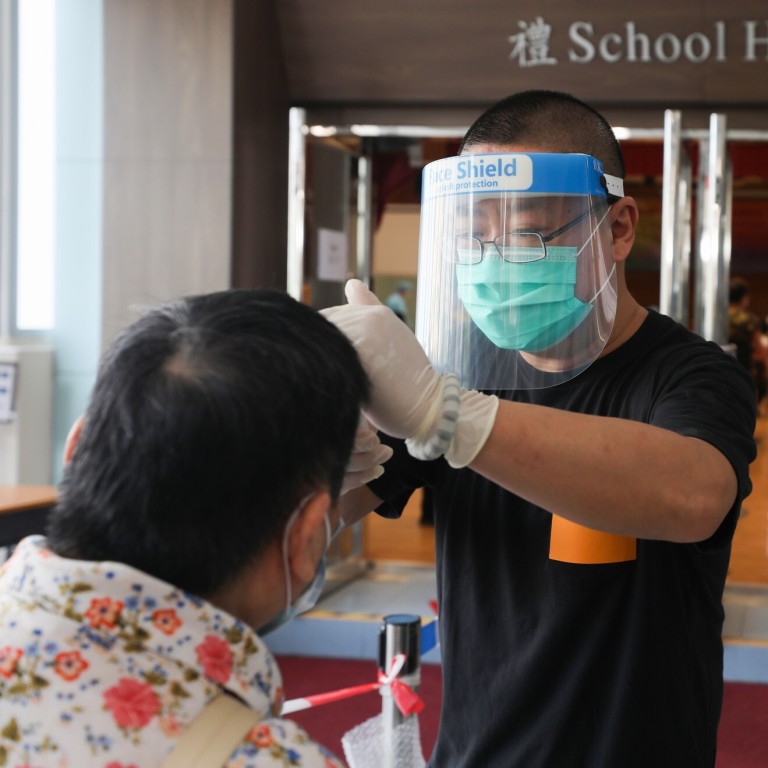
Coronavirus: 82,000 Hongkongers tested in first eight hours of Covid-19 screening scheme despite boycott calls
- Number of people tested climbs as screening gets under way on Tuesday at 141 centres across all 18 districts of the city
- Critics have raised fears over privacy and wasting resources, but 650,000 residents have registered for the tests so far
About 82,000 Hong Kong residents were tested for the coronavirus eight hours after the universal testing programme launched on Tuesday, amid calls from activists and some health workers for a boycott.
The effort began at 8am sharp, with workers taking samples from residents at 141 collection centres across all 18 of the city’s districts. By 4pm, about 82,000 people had been tested, according to Patrick Nip Tak-kuen, the secretary for the civil service.
He also said that 650,000 people had registered for the programme, which was expected to run for a week but could be extended for another week. The number is still just a fraction of the city’s population of about 7.5 million.
Everything you need to know if you’re getting tested for Covid-19
In an attempt to encourage people to sign up, Hong Kong leader Carrie Lam Cheng Yuet-ngor, her ministers and cabinet members, were among the first to be tested on Tuesday.
“The whole process and experience is safe, simple, convenient and fast,” said Lam, who was tested with colleagues at the government headquarters at Tamar.
Health experts taking the test themselves appealed to the public to respect individual choices over whether to do so – with the scheme becoming highly politicised in recent days – as they called for regular screening for high-risk groups once the universal system ends.
To get tested or not?
At City Hall in Central, there was no line of people waiting to get tested.
Jogger T. Lee said he would not get tested and called the process “meaningless”.
“If I got tested, I would be walking around and would get the results in a few days’ time,” said the 50-year-old who works in the legal sector.
“The only point of this would be if there is a total lockdown where nobody is allowed to leave their homes, and then we test people batch by batch, only letting them out when all the results are known. It’s a complete waste of money.”
He said he did not know why the government decided to spend resources on mass testing after deciding earlier to postpone the Legislative Council elections set for this month over the Covid-19 outbreak.
“They are crowding many people into centres – how is that different to people voting?”
But among those who got tested was Ellen Tsang, chairwoman of the pro-Beijing group the Y. Elites Association.
She said she had encouraged staff at the association, which comprises young professionals, to get tested, but there was a split between younger and older people.
‘Important for kids to get tested before school resumes’
At about 2pm, about a dozen people were in line to get tested outside Queen’s College in Causeway Bay, which was used as a polling station during the 2016 Legislative Council election.
A special-education teacher, Lam Suet-po, 55, said she had urged parents and students to take part in the testing scheme.
“To be safe, I think it’s important that families, especially those with kids, get tested, so that we can prevent any possible outbreaks when classes resume,” she said.
Lam hoped more people would participate in the voluntary scheme, as it was found that asymptomatic patients had previously visited nearby malls and restaurants amid the city’s third wave of infections.
But a 20-year-old online shop owner, who was passing by Queen’s College and only gave her name as Wong, said she doubted the accuracy of the test kits.
“I’d wait a week to see how accurate the kits are first before participating,” she said, referring to recent Swedish reports of 3,700 false-positive results returned by kits from BGI Genomics, one of the providers in the Hong Kong scheme.
“I also don’t understand why the government would allow thousands of people to get tested at the exact locations where people would vote,” Wong said. “If we’re allowed to queue up and get tested, why can’t we queue up to vote?”
Queues form before programme begins
Small queues, including at two centres in Hung Hom and Sha Tin, were seen before the programme’s official starting time.
Participants had to go through a temperature check at the entrance before heading into the gymnasium to give a sample. Staff wearing face shields stood at the entrance to ensure people were queuing 1.5 metres apart within the building.
Social distancing, however, was not enforced outdoors. Queues reappeared outside the centre whenever a new batch of participants arrived.
Hong Kong expects 12 new Covid-19 cases, hospital chief vows to test all patients
Yuen Mi-ling, a 66-year-old housewife who arrived at the Yuen Wo Road facility at Sha Tin with her husband, said she would stay at home for 14 days after taking the test, a precautionary measure suggested by the Centre for Health Protection.
“I‘m not scared. I haven’t thought much about being infected,” she said. “I hope I can fulfil my responsibility as a citizen. I hope eateries can [fully] reopen.”
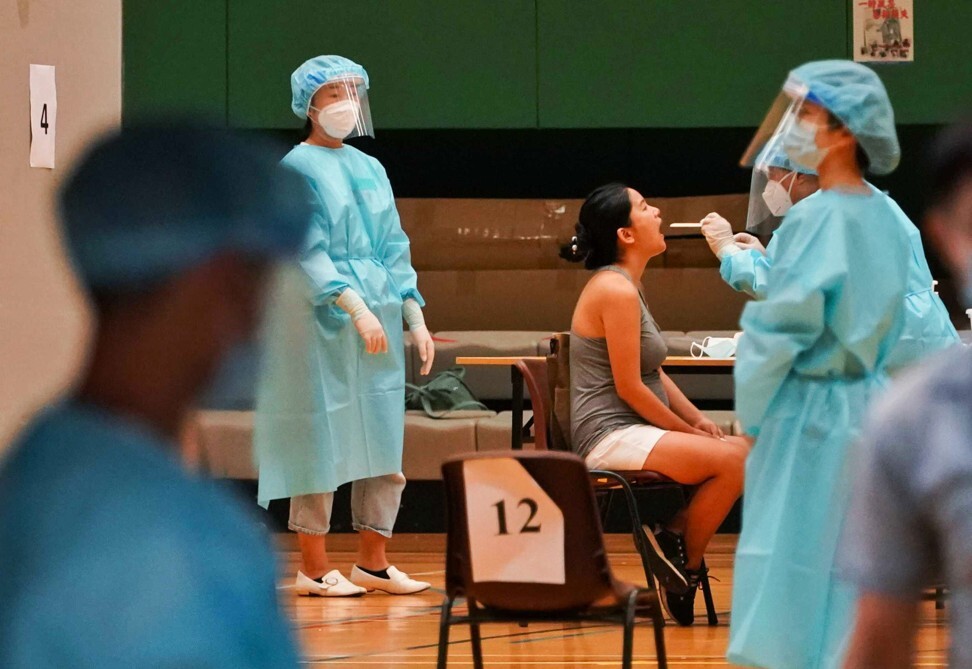
First to be tested
Un Kin-siu, a 64-year-old retiree living in Tsz Ching Estate in Tsz Wan Shan, was among the first to be tested at the area‘s community hall. The Tsz Wan Shan neighbourhood has endured a spate of Covid-19 cases since early July, with at least 160 residents or workers there infected.
Goodbye, nasal swabs? Saliva tests can detect coronavirus
Many decided to undergo a second test despite being screened earlier under the system for high-risk groups.
“I live in a high-risk area and have underlying conditions. I think it’s better to do a second test because they will take a nasal and throat swab this time, not just a deep throat saliva sample,” she said.
“I noticed that many elderly people want to get tested but do not know how to register online.”
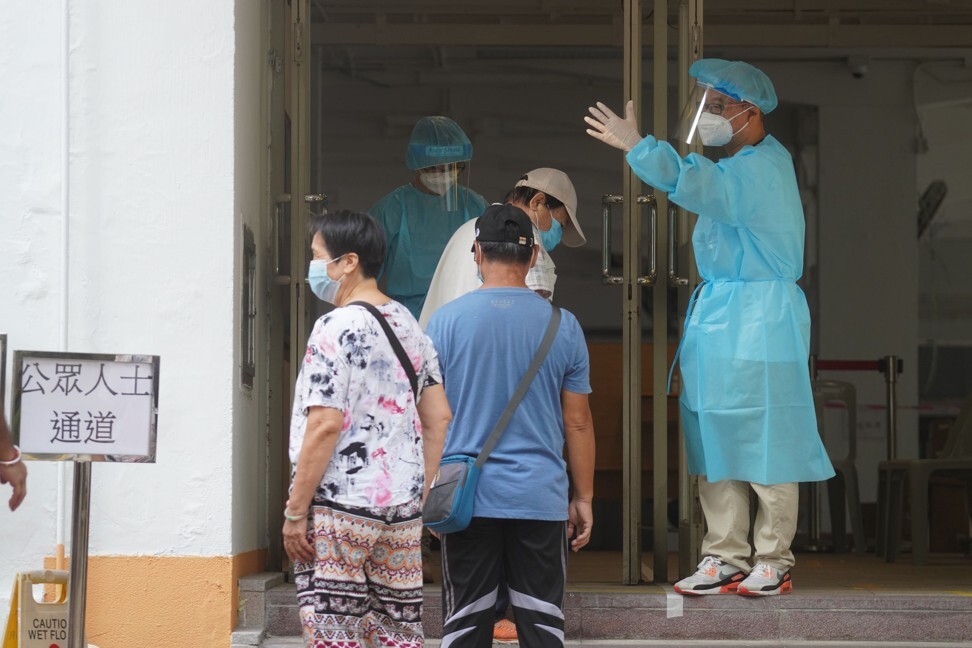
A 44-year-old man surnamed Yung, who installs air conditioners in residential areas, said he felt good after taking the test. “Because then I know I won’t infect others if I test negative, especially when I have to come in contact with a lot of people at work,” he said.
Taxi driver Yau Cheong-him, 57, was one of those who decided to take a second test.
“I don‘t know if I am infected. I see new passengers every day,” he said.
Delivery truck driver K.F. Wong, who is in his 50s, was among the first being tested at Lung Cheung Government Secondary School in Wong Tai Sin, an area that also emerged as a virus hotspot.
“I’m taking the test so my family and I can feel more at ease,” he said. “I may have to go to high-risk places for work so it’s better to know if I’m infected or not.”
He added that even if there were social-distancing measures, people would flout the rules.
“You can’t stop all gatherings,” Wong said. “At least we’re getting results out of the scheme, and can find silent carriers through testing.”
Barometer for public opinion
The number of participants in the scheme – due to last at least seven days – is being viewed as a barometer for public opinion on the involvement of about 220 personnel from mainland China in carrying out the tests.
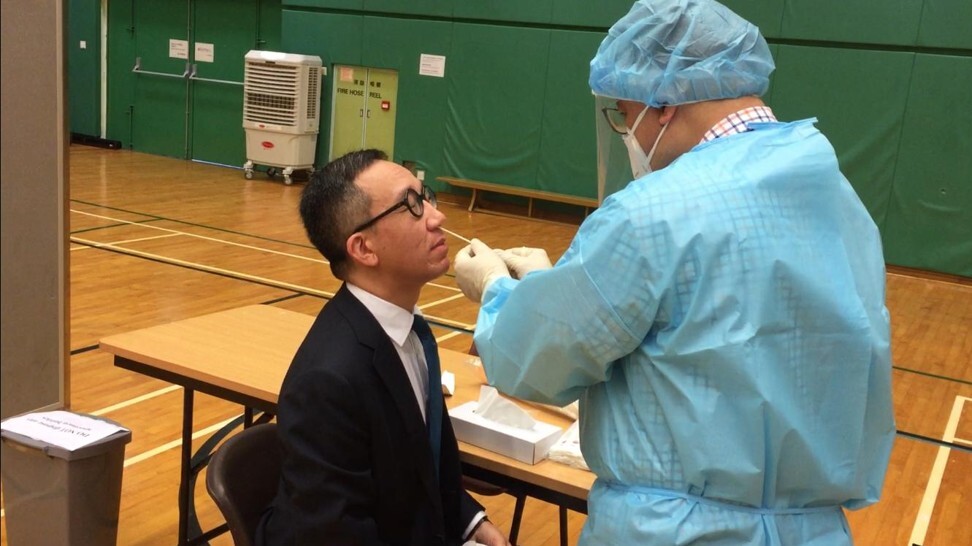
The government said bookings at 99 centres were full for the first day of the scheme, with participants preregistering online for a half-hour time slot for the tests, after which they received a free pack of masks.
But some people at the two centres in Tsz Wan Shan and Sha Tin were able to take part without having an appointment by filling unallocated time slots.
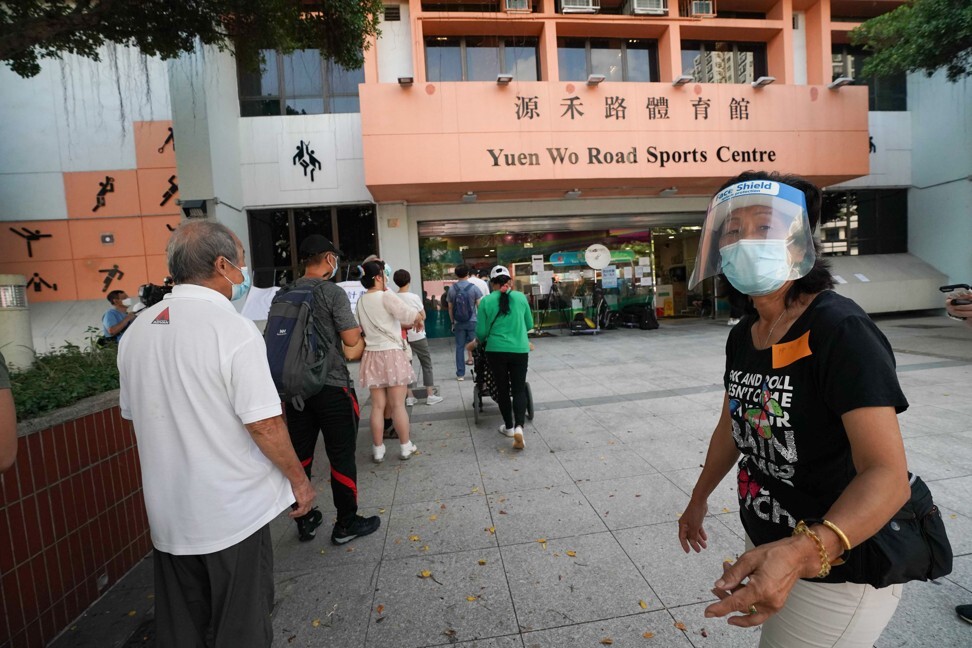
Medical experts take the tests
Two government public health advisers, professors David Hui Shu-cheong and Gabriel Leung, helped each other take the tests before 8am in the Yuen Wo Road centre.
“The process is finished within two minutes, and I did not feel any pain during the process,” Hui said.
“I believe it’s important to participate in order to cut off any hidden transmission in the city.”
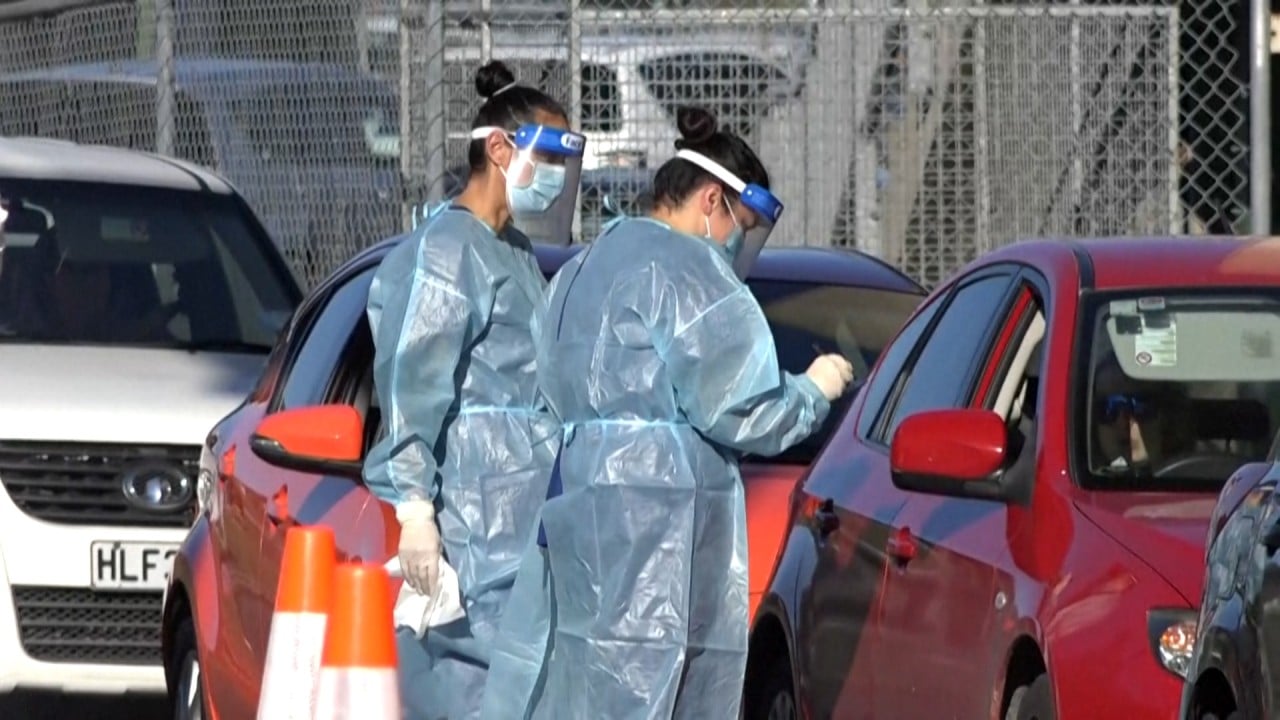
02:07
Global coronavirus cases surpass 25 million as India deals with world’s fastest-growing outbreak
Leung said: “People should respect each person’s consideration for doing the tests or not. Apart from considering the patients that I may have contact with, I also feel more comfortable when meeting with friends and relatives after taking a test.”
Leung reported a bottleneck in testing capacity over the past few months. “But if we increase the testing rate greatly, we hope we can save some testing capacity for regularly testing for high risk groups, like the elderly.”
What you need to know about Hong Kong’s mass Covid-19 tests
Disapproval of testing locations
Some disapproved of the choice of testing locations, with district councillor Chu Kong-wai seen alongside residents on Tuesday distributing leaflets and hanging a banner campaigning against the use of the MacPherson Stadium in Mong Kok as a screening centre.
The residents said they were concerned about the contagion risks relating to a sewage pipe shared between the stadium and the accommodation above.
Eight other district councillors, including Roy Tam Hoi-pong of the Neo Democrats party, were also among those arguing the government should be able to hold the Legislative Council elections if the mass testing scheme was not considered an undue risk.
A group of activists led by Joshua Wong Chi-fung and the Hospital Authority Employees Alliance, a union representing frontline staff at public hospitals, had pushed for a boycott of the testing on Sunday. They cited the recent false-positive reports, and questioned the accuracy of citywide testing.
More than 553,000 Hongkongers sign up as mass Covid-19 testing set to start
Say no to boycotts
Dr Tony Ko Pat-sing, Hospital Authority’s chief executive, said the authority disagreed with calls from the alliance to boycott the testing scheme.
“Individual workers’ opinions do not represent the Hospital Authority,” he told a radio programme on Tuesday. “We should look at this from a professional and scientific perspective.”
While targeted testing of high-risk groups had managed to catch those infected with the virus, Ko explained there were still about 20 per cent of patients whose source of infections were untraceable and they did not belong to high-risk groups.
The State Council’s Hong Kong and Macau Affairs Office and Beijing’s liaison office have issued separate statements, hitting out at critics who questioned mainland authorities’ help in the fight against the pandemic, calling them “evil” for slandering the cooperation.
The city confirmed 12 cases on Tuesday and nine on Monday, the fewest since the Monday prior, which was the lowest daily number since July 3. The tally now stands at 4,822.
Additional reporting by Zoe Low





